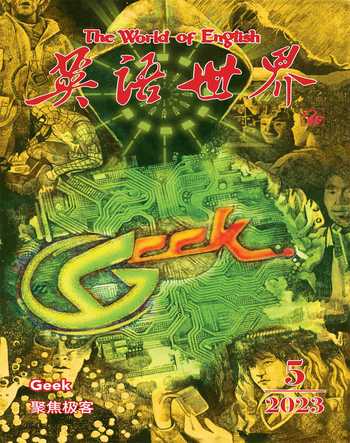What Does It Mean to Be a Geek?何谓极客?
朱瑞旻/译

geek
极客
Noun. Slang. A person whose interests ALWAYS take precedence over popularity or conformity. A person who displays the willingness to bear the public shame of liking some weird thing and not caring who knows it.
—GeekDad1 Jim MacQuarrie
名词(俚语),做事总是凭兴趣、而不是赶时髦或随大流的人。有个与众不同的喜好、不怕别人知道且看起来甘愿为此受到大家指指点点的人。
——“极客好父亲”撰稿人吉姆·麦夸里
Back in a previous life, when I was studying for an A.M. in social sciences at the University of Chicago, I did some thinking about group formation. This was right at the end of the Balkans War2. One of the things which becomes apparent if you study history is that it is much easier to build a group identity around who is not part of the group, than it is to actually describe why people are included in a group. So for instance, Serbians found it easier after the breakup of Yugoslavia to define what it meant to be Serbian by saying they were not like Bosnians and Croats than they did to define exactly what it meant to be Serbian. This led to conflict, even though these three ethnic groups had lived peaceably in Yugoslavia for nearly fifty years. In the same way, during the period from about 1880 to 1945 one influential way Germans understood what it meant to be a good German was by describing it as everything that wasnt Jewish.
当初我在芝加哥大学攻读社会科学硕士学位时,对群体的形成有所思考。那时,巴尔干半岛的战火刚刚平息。你如果研究历史,就会明白一点,基于非群体成员的特征来确定某一群体身份,要比具体描述群体成员共有的特征容易得多。例如,南斯拉夫解体之后,塞尔维亚人发现,基于与波斯尼亚人和克罗地亚人的不同来界定自身,比界定究竟何谓塞尔维亚人更容易。这就导致了冲突,尽管这三个族群曾在南斯拉夫和平相处了近50年。同样,对于何谓正宗的德国人,在约1880年至1945年间德国人有一种理解方式影响甚广,即具备犹太人没有的一切品质。
Before any of us starts feeling smug, we ought to remember this kind of identity formation for groups takes place all the time in small and large ways, whether that is in social groups, in business, or academia. When building a coherent group out of a disparate bunch of people it is much easier to say things like “that activity isnt geeky” or “you arent a geek” than to say “this is what it means to be a geek.”
在开始自鸣得意之前,我们应该记住,群体的这种身份形成一直在或大或小的范围内持续,无论社会群体、工商界还是学术界都是如此。把各色人等组建为一个和谐的群体时,说“那个不算极客活动”或“你不是极客”之类的话,要比说“这样的人谓之极客”容易得多。
I dont believe that any activity or sport can be said to be Geeky in itself. As fellow GeekDad contributor Jim MacQuarrie said in a recent email, “[a person] can be a sports geek, a Barbie geek, or a philately geek.” The quality of geekiness resides in the person, not in the activity itself.
我认为,没有任何一项活动或运动本身就可以称为极客活动或极客运动。正如同為“极客爸爸”撰稿人的吉姆·麦夸里最近在一封电子邮件中所说:“(一个人)可以是体育极客、芭比娃娃极客或集邮极客。”具备极客特质的是人,而不是活动本身。
One of the great reasons to identify with the word “geek” is that it gives you permission to like what you like no matter what it is. Many of us self-identify as geeks because we have been put down, excluded, and hurt by others due to our interest in “uncool3” things like comic books, or board games, or computer programming.
“極客”一词受到认同的一大重要原因在于,它能够让人名正言顺地爱自己的所爱,无论那是什么。我们许多人自我认同为极客,因为我们曾因对漫画书、棋类游戏或计算机编程等“不酷”的事物感兴趣而遭他人贬低、排斥和伤害。
However, as geek culture becomes more mainstream and popular, geeks are beginning to want to try to define what activities are necessary to be a true geek. As soon as we as a geek community start down that road we end up doing the same kind of cultural bullying which caused us to self-identify as geeks in the first place. When we exclude others because they lack “geek cred4” we prove we havent really learned anything from our life experiences. We are as messed up as those who looked down on us and used the term “geek” as an insult.
然而,随着极客文化日益成为主流文化和大众文化,极客们开始想尝试界定,当个真正的极客需要从事哪些活动。一旦我们极客社群开始这样去做,我们最终搞出的是文化霸凌,而最初正是这种文化霸凌使我们自我认同为极客。因为别人缺乏“极客声望”而排斥他们,意味着我们没有真正从自己的人生经历中吸取任何教训。我们和那些曾经看不起我们、用“极客”这个词来侮辱我们的人一样糟糕。
As a geek, I am really tired of the culture wars, and I hope to avoid taking part in them even if others try to drag me in. That is harder than it may sound. MacQuarrie has posted a little article on a recent controversy in the archery community. Denise Parker, the CEO of USA Archery, was quoted as saying, “archery is kind of a geek sport.” Apparently some in the archery world didnt like this label and took umbrage5 and Parker was forced to issue an apology.
作为一个极客,我真的厌倦了文化战争,即使别人试图把我拖入其中,我也希望避免参战。这听起来容易,做起来难。麦夸里发布了一篇针对射箭界最近争议事件的短文。文章引述了美国射箭协会首席执行官丹尼丝·帕克的话:“可以说,射箭是一项极客运动。”射箭界的一些人显然不喜欢这个标签,并大为光火,于是帕克被迫发表道歉声明。
My instant reaction is to get irritated when someone from the archery world gets angry when it is called a geek sport. Is this a bad thing? I want to go fight for the label I embrace. But if I were to enter the fray6, I would have already lost the battle, because that whole conversation is trying to decide what content fits under the word geek. Archery isnt a geek sport any more than curling and basketball are geek sports, but there are such things as archery, curling, and basketball geeks.
当射箭界有人因射箭被称为极客运动而感到愤怒时,我的第一反应是恼火。这是件坏事吗?我想为我所悦纳的标签而战。但假如我参加这场论战,我应该已经输掉了,因为整场论战都是在试图确定,什么事物符合极客这个词的含义。射箭并不是极客运动,正如冰壶和篮球不是极客运动,但是存在射箭极客、冰壶极客和篮球极客这样的人。
The genius of Jim MacQuarries definition of the word geek is that it clearly defines what it means to be a geek without excluding anyone. It tells people to be who they want to be no matter what others say. It simply says be who you are, no matter what it costs you. And that is a definition of a geek that I can support.
吉姆·麦夸里对极客一词的定义,其独特之处在于既清楚地界定了何谓极客,又没有排斥任何人。它告诉人们,成为自己想成为的人,不管别人怎么说。说白了,成为你自己,不管付出什么代价。而这,是我会赞同的对极客的定义。
(译者为“《英语世界》杯”翻译大赛获奖者)

